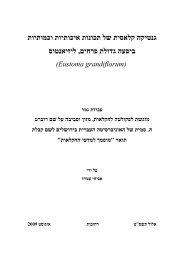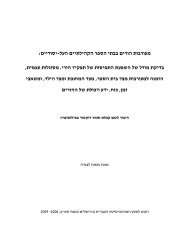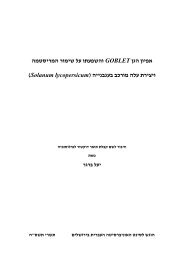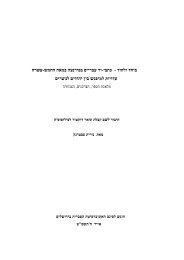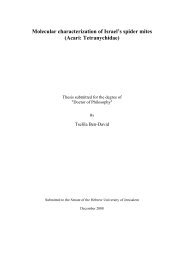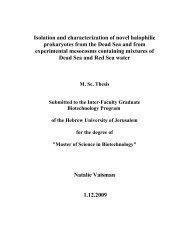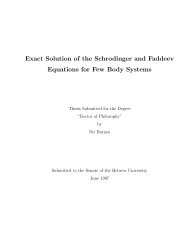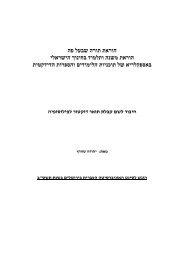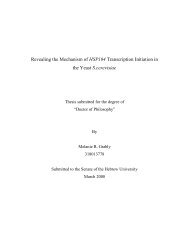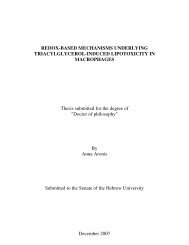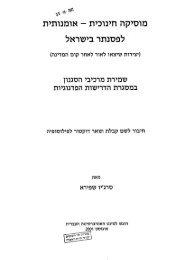××ר×ת ס×פ×ר ×× ×¡ ××קר×× ×××× ×× ××××××ª× ××שר×× - ×××× ××רס××× ××¢×ר×ת ...
××ר×ת ס×פ×ר ×× ×¡ ××קר×× ×××× ×× ××××××ª× ××שר×× - ×××× ××רס××× ××¢×ר×ת ...
××ר×ת ס×פ×ר ×× ×¡ ××קר×× ×××× ×× ××××××ª× ××שר×× - ×××× ××רס××× ××¢×ר×ת ...
Create successful ePaper yourself
Turn your PDF publications into a flip-book with our unique Google optimized e-Paper software.
persuaded of the value in Buber`s teachings for the mamad, it would be necessary to<br />
"translate" some of Buber`s thought into language and terms accessible to that milieu.<br />
Chapter 6: The deliberation up until this point has centered largely around the subject<br />
matter – both "pure" biblical content, as well as different hermeneutical options that<br />
can contribute to the teaching of biblical miracle stories. We define the latter as<br />
"supportive" material. Now it is up to the representatives of the students to help<br />
determine the age when students attain the ability to apply non-literal reading<br />
strategies to biblical miracle stories. The metaphoric and dialogic approaches to<br />
miracle stories demand of the reader/student a certain degree of abstract thinking, as<br />
well as the ability to consider simultaneously more than one interpretation of the<br />
story. In addition, these approaches are designed to evoke emotions such as<br />
amazement, awe, fear, dismay, and identification, which may be inappropriate for<br />
children of a particular age or stage of development. We will use the term "multidimensional"<br />
to refer to the kind of learning that takes into account a "higher order" of<br />
thinking and emotion, and that includes the weighing and evaluation of several<br />
cognitive and emotional options.<br />
Various schools of thought have addressed the question of cognitive and<br />
emotional preparedness for learning, and two in particular appear to be helpful in<br />
determining the proper timing for multi-dimensional learning: the developmental, and<br />
"philosophical" schools.<br />
(a) The developmental school posits that children`s<br />
cognition and emotion develop through progressive and orderly stages, proceeding<br />
from the simple to the complex. Intervention by outside parties will have little impact<br />
on expediting the child`s abilities or achievements, because his growth is governed<br />
by an internal dynamic and by age. According to many developmentalists, there is a<br />
strong correlation between cognitive and emotional growth, exemplified by the way<br />
321




